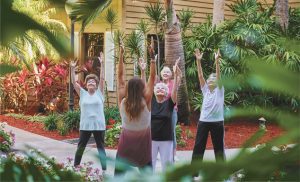 Today’s older adults have more levels of care to choose from than ever before, and while this variety helps ensure families can find a level of care that meets their needs, there is a lot to learn about each type.
Today’s older adults have more levels of care to choose from than ever before, and while this variety helps ensure families can find a level of care that meets their needs, there is a lot to learn about each type.
In a Life Plan Community like Freedom Village of Bradenton, you’ll find what is referred to as a continuum of care. It’s an option that accommodates a senior’s current needs while also planning for their future. Because multiple types of care are found on the same campus, residents can seamlessly transition from one type to another if their health changes.
Before you begin making calls and scheduling in-person visits to communities, it might be helpful to learn more about independent living, assisted living, memory care, skilled nursing; and short-term rehabilitation. And to compare assisted living, one of the most popular types of senior living, with other options.
What is Assisted Living?
An assisted living community is a senior living option many consider an ideal combination of support and independence. Each resident has their own private apartment or suite to call home that enables residents to maintain a sense of independence and to feel they are still in charge of their own life.
They do so, however, knowing the support of caregivers is nearby 24/7. The caregiving staff can assist with everything from taking a shower to helping with medication. Residents of an assisted living community generally require help with two or three activities of daily living (ADLs), as well as medication management support. This could include personal care tasks such as bathing, grooming, dressing, transferring, toileting, and continence care.
Other services and amenities usually found at an assisted living community are:
• Healthy, chef-inspired meals and snacks
• Transportation program for outings and appointments
• Personal laundry, linen changes, and housekeeping
• Wellness programs, daily activities, and community events
• Utilities, internet access, and cable
• On-site security and emergency call systems
For many, the most popular part of community living are life-enrichment activities. These can vary from one community to another but often include exercise classes, book clubs, art workshops, card groups, happy hours, movie nights, shopping trips, cultural outings and participating in volunteer projects.
What’s the Difference Between Assisted Living And Other Types of Senior Care?
The best way to understand how assisted living differs from other senior care options is to learn a little more about each one:
• Independent living: Older adults who are looking for maintenance-free living are often attracted to independent living communities. Instead of spending your days mowing the yard, making home repairs, or cleaning the gutters, you’ll have time to socialize, travel, and enjoy life. It’s a lifestyle that promotes choice, flexibility, and freedom. Independent living residents are generally more active and able to care for themselves than those in assisted living.
• Skilled nursing: While residents in an assisted living community typically require help with ADLs, seniors in a life plan community’s skilled nursing center tend to have more complex medical needs. Licensed nurses are on-site around-the-clock to assist residents. Many also have nurse practitioners and physicians who oversee care. These residents still enjoy the same amenities as assisted living communities, such as nutritious meals, life enrichment programming, and support with personal care.
• Memory care: When a senior loved one has a diagnosis of Alzheimer’s or another type of dementia, family caregivers face unique challenges with safety being a leading concern. Because judgment can become impaired, an older adult with dementia might not be safe alone. They may also experience episodes of wandering from home, agitation, and increased anxiety. Even figuring out what meals to cook can be tough. In a memory care program, you’ll find a secure environment designed to be peaceful and comforting. Activities are developed to work around disease-related losses, enabling the resident to feel successful and productive. Every aspect of these specialty programs is focused on protecting dignity.
• Rehabilitation: This type of care is short term and typically follows a hospital stay. If an older adult has had a serious illness or injury or a planned surgery, they may transition from the hospital to a rehabilitation center to continue their recovery. In addition to nursing staff, you will usually find physical, occupational, and speech therapists. The goal is to help the senior recuperate and return to whatever setting they call home, whether it is a private residence or an apartment in an independent or assisted living community.
If you are searching for care along the Gulf Coast of Florida, we invite you to consider attending this special luncheon at Freedom Village of Bradenton:
Understanding Senior Living Options:
How to Determine What’s Best for You and Your Family
Thursday, March 21
11:30 a.m. – 1:30 p.m. Tuscany Dining Room
At this luncheon, you will learn about:
– Different types of senior living communities and the differences between independent living and assisted living
– Our Life Care Guarantee and contract options
– Home Care Health Services for seniors living in independent or assisted living
– The importance of Estate/Financial planning
Advance reservations are required for the luncheon by calling 941-231-7434.
www.fvbradenton.com
6406 21st Avenue West, Bradenton, FL 34209









